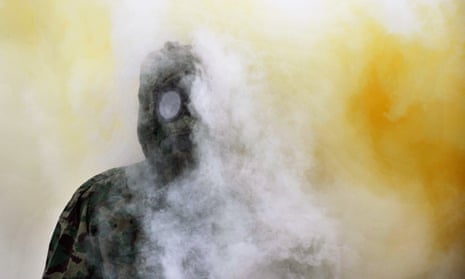The US author Jesse Ball’s novel is a haunting and deeply felt parable about duty, morality and violence. In its three interlinked sections, continuous narrative and character development are less important than the creation of an intensely felt allegorical universe, which is as compressed and compelling as a folk tale.
The world has suffered a cataclysm. The animal population has collapsed and conflict has intensified, culminating in a “final, enormous war”. Huge numbers of refugees have resulted. Society has been transformed into what the narrator of the first part describes as “a kind of modern-day Sparta”: a brutally stratified culture. Incomers are marked, through a facial brand and later the removal of a thumb, and legally defined as non-persons. They are corralled into walled areas outside each city, called quadrants. These people become known as “quads” or, in a piece of cruel humour, “niners”. Citizens – or “pats” – are armed with lethal gas, which they can use with impunity against the quads. But their own lives are also rigidly ranked.
In their class on “historical pathologies”, students Lethe and Lois are taught by their lecturer, Alan Mandred, that these changes create “a vibrant morality” based on “a new definition of violence”; that “things done to those beneath are not properly violence”. Mandred insists that the work of separation, of marking and mutilation, is right and natural: “we are a good and fair society”, “we have hearts”. But the radical separation of people into rigidly stratified ranks, reinforced by a gospel of cruelty, has fostered an everyday life of loathing and violence.
The society regulates this excess of rage and fear through vast street festivals. The pats have Ogias’ Day, where all obligations are wiped clean: debt, job contracts, marriage. Lethe whispers: “They have to do it, or the government would fall apart.” But the reader never gets to see what this festival looks like, or understand what the day means to this world, and we abandon these characters for good.
Ball is much more interested in showing us the quads’ festival of misrule, the Day of the Infanta, in which a young girl is chosen to be absolute ruler for the day, with an honour guard of “grouchers” to do her bidding, “no matter how awful”. At the climax of the festival a second Infanta – a papier-mâché simulacrum – will be thrown to the crowd to be destroyed in a frenzy. But if this does not fully discharge their rage, the girl will be next.
As the Day of the Infanta begins, the story moves on to a boy, Eben, who has been given the job of taking care of Ollie, the son of a powerful quad named Mr Spencer. Eben, Ollie and friends have gone to the Sisters, two ponds connected by a tunnel. Swimming through it is the divers’ game – and only the bravest and hardiest can overcome this symbolic separation.
The moral purpose of the book comes into agonisingly sharp focus in the last section. Mandred’s wife, Margaret, writes a letter to her husband in which she describes her day. She goes for her usual walk and meets a man – a quad. Fearful of him, she puts on her gas mask and releases a canister. Finally, and too late, she realises with revulsion the true nature of her society. “We are maintained by a violence so complete, it is like air … a man like this did not die because of what he did but because of what he was.”
Ball sharply and uncomfortably reimagines our world of normalised killings of the weak by the strong: executions, extrajudicial killings, domestic murder. This world we have made, where refugees end up in border camps and detention centres. By abstracting his fictional reality from ours and presenting it in its bare essentials, he makes the moral basis of our present moment clearer. His novel is a harsh judgment on our lack of empathy, and our desire to separate others into persons and non-persons.
The Divers’ Game is as much a critique of the past as the present. It works as a fable not only about the treatment of migrants but also about antisemitism, and about slavery and its continuing consequences. It interrogates the stories we persist in telling about what it is to be a person, and how often they contain the lie of superiority asserted as nature. Ball fictionalises this culture of dominance, and captures how it metastasises into institutions of justice and education, as well as into the gestures and choices of everyday life. By exposing the workings of supremacy in the human imagination, his novel makes a contribution towards preventing it from being our permanent future.
